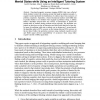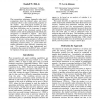605 search results - page 55 / 121 » To Tutor or Not to Tutor: That is the Question |
CG
2006
Springer
13 years 11 months ago
2006
Springer
While recently the strength of chess-playing programs has grown immensely, their capability of explaining in human understandable terms why some moves are good or bad has enjoyed l...
COGSYS
2005
Springer
13 years 9 months ago
2005
Springer
Abstract. Natural language interaction between a student and a tutoring or an assistance system for mathematics is a new multi-disciplinary challenge that requires the interaction ...
EDM
2010
13 years 9 months ago
2010
Functional magnetic resonance imaging (fMRI) data were collected while students worked with a tutoring system that taught an algebra isomorph. A cognitive model predicted the distr...
AAAI
1994
13 years 9 months ago
1994
Plan recognition techniques frequently make rigid assumptions about the student's plans, and invest substantial effort to infer unobservable properties of the student. The pe...
UMUAI
2008
13 years 7 months ago
2008
Abstract. Self-efficacy is an individual's belief about her ability to perform well in a given situation. Because selfefficacious students are effective learners, endowing int...


